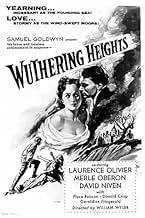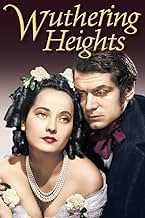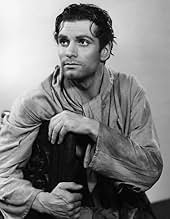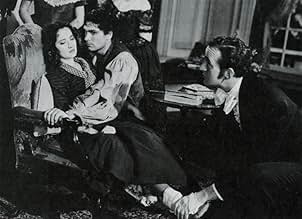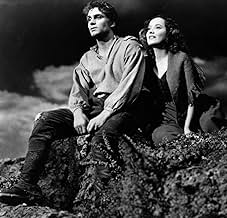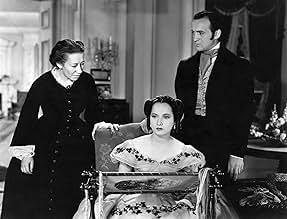Une domestique du domaine des Hauts de Hurlevent raconte à un voyageur le récit tragique des amants Cathy et Heathcliff.Une domestique du domaine des Hauts de Hurlevent raconte à un voyageur le récit tragique des amants Cathy et Heathcliff.Une domestique du domaine des Hauts de Hurlevent raconte à un voyageur le récit tragique des amants Cathy et Heathcliff.
- Récompensé par 1 Oscar
- 7 victoires et 7 nominations au total
Sarita Wooton
- Cathy (as a child)
- (as Sarita Wooten)
Frank Benson
- Heathcliff Servant
- (non crédité)
Romaine Callender
- Robert
- (non crédité)
Richard Clucas
- Little Boy
- (non crédité)
Vernon Downing
- Giles
- (non crédité)
Histoire
Le saviez-vous
- AnecdotesLaurence Olivier found himself becoming increasingly annoyed with director William Wyler's exhausting style of filmmaking. After yet another take, he is said to have exclaimed, "For God's sake, I did it sitting down. I did it with a smile. I did it with a smirk. I did it scratching my ear. I did it with my back to the camera. How do you want me to do it?" Wyler's retort was, "I want it better." However, Olivier later said these multiple takes helped him learn to succeed as a movie actor.
- GaffesThough the social situations, and even the soundtrack, are consistent with the novel's timeframe of 1770-1801, the Colonial/Napoleonic era, the costumes are an odd mix of mid-Victorian and American Civil War.
- Citations
Heathcliff: Catherine Earnshaw, may you not rest so long as I live on! I killed you. Haunt me, then! Haunt your murderer! I know that ghosts have wandered on the Earth. Be with me always. Take any form, drive me mad, only do not leave me in this dark alone where I cannot find you. I cannot live without my life! I cannot die without my soul.
- Crédits fousOpening credits prologue: On the barren Yorkshire moors in England, a hundred years ago, stood a house as bleak and desolate as the wastes around it. Only a stranger lost in a storm would have dared to knock at the door of Wuthering Heights.
- Versions alternativesThere is an Italian edition of this film on DVD, distributed by DNA Srl: "CIME TEMPESTOSE (1939) + ORGOGLIO E PREGIUDIZIO (1940)" (2 Films on a single DVD), re-edited with the contribution of film historian Riccardo Cusin. This version is also available for streaming on some platforms.
- ConnexionsFeatured in AFI Life Achievement Award: A Tribute to William Wyler (1976)
- Bandes originalesPiano Sonata in A major, K.331: Rondo alla Turca
(1778) (uncredited)
Music by Wolfgang Amadeus Mozart
Played by Alice Ehlers on harpsichord
Commentaire à la une
Being a classic film buff, I had the chance of being introduced to this film by chance one late evening when it was being aired on TCM. I fell in love with the movie, and when I was told that it would be required reading over the summer, I was ridiculously happy. As many have noted, the 1939 adaptation of "Wuthering Heights" is, more or less, merely the first volume of Emily Bronte's beautifully and powerfully written classic -- focusing less on the detail of Heathcliff's wrath post Cathy's death, but moreso on the sheer complexity of Heathcliff and Cathy's relationship (the scenes at Penniston Crag of them among the moors and heather are not in the book because Bronte had to stick to Ellen's point of view -- it was nice that we could finally have an in-depth look at the tumultuous relationship between Cathy and Heathcliff). While characters are omitted (Frances, Hareton, Linton and the baby Catherine), it still retains much of the very nature of the novel. (If you will recall, many parts of "Gone With The Wind" were changed and characters removed in the process of transferring Margaret Mitchell's masterpiece into a screen epic. After all, this is Hollywood.)
The cinematography is divine (very much worth its Oscar), perfectly capturing the very essence of the bleak, chilling, haunting Yorkshire Moors that Bronte described in her book. Laurence Olivier is, in my opinion, a very fine Heathcliff. Indeed, in the book his nature is more animalistic and devilish, but Olivier superbly exhibits what Heathcliff is all about -- dark, brooding, and terribly bitter. Even at our first introduction to him, we know by the tone of his voice that something is very, very wrong with this man and that something is very, very off in that household. Olivier expresses Heathcliff's wildness and devilishness through his voice, stance and through his facial gestures, rather than so much in other physical ways. Merle Oberon is remarkable as Cathy -- a much more dark and exoctic beauty than Isabella whose good looks are very wholesome and pure (perhaps to match the darkness of the gypsy stable-boy Heathcliff), and capturing the duality of personality that is Catherine Earnshaw -- part of her wanting to love a wild, evil, wicked stable boy... the other part longing to be part of a higher society. Particularly coming to mind is her scene in the kitchen with Ellen and that marvelously disturbing death scene -- her eyes wild. (I do wish they would have left in the part of the book where she refuses to eat and begins hallucinating -- Oberon could have performed it so well.) Also to be noted are the stunning performances of David Niven and Gerladine Fitzgerald as the long-suffering Edgar and Isabella Linton (respectively), their lives made miserable by Cathy's selfishness, vanity and greed to be part of a higher way of living, and by Heathcliff's undying love for Catherine and his course of revenge and destruction. Flora Robson is also wonderful as Ellen Dean, narrator of the whole sordid story.
Someone mentioned that this film (by focusing on the love story and by the ending, I suppose) tried to say that Heathcliff and Catherine were perfect for each other and could have, eventually, found true love. I disagree, wholeheartedly. I believe what director William Wyler was trying to say here was that Heathcliff and Catherine were not good people. Cathy was right when she said that she and Heathcliff's souls were made of the same basic fiber -- they were both greedy and selfish (he wanted her passion for him to be as deep as his passion for her and she wanted and if he couldn't have it, no one else deserved to have it, and God forbid those around him feel any kind of love, compassion or humanity; and she didn't even really know what she wanted, except to be part of the upper crust and to rise above what she had lived through when Hindley became master of their house) and because of that, their love could have never meant anything BUT tragedy. They could never have found happiness together because they were not happy people. But they could find love in death -- because in death, they could be what they really were all along -- children; mere children forced to grow up all too quickly with the death of the man who cared deeply for them, thus forcing Hindley to become head of the household. There would be no Hindley in death. And as children they were good together -- as children, Cathy, wicked as she was at times as a youngster, could restore hopes of prosperity to Heathcliff's dark, bitter soul. They were, as children, more or less all one another had. And so they could go on, as children, without a care, happily picking heather and being King and Queen on the moors.
You've GOT to see this movie.
The cinematography is divine (very much worth its Oscar), perfectly capturing the very essence of the bleak, chilling, haunting Yorkshire Moors that Bronte described in her book. Laurence Olivier is, in my opinion, a very fine Heathcliff. Indeed, in the book his nature is more animalistic and devilish, but Olivier superbly exhibits what Heathcliff is all about -- dark, brooding, and terribly bitter. Even at our first introduction to him, we know by the tone of his voice that something is very, very wrong with this man and that something is very, very off in that household. Olivier expresses Heathcliff's wildness and devilishness through his voice, stance and through his facial gestures, rather than so much in other physical ways. Merle Oberon is remarkable as Cathy -- a much more dark and exoctic beauty than Isabella whose good looks are very wholesome and pure (perhaps to match the darkness of the gypsy stable-boy Heathcliff), and capturing the duality of personality that is Catherine Earnshaw -- part of her wanting to love a wild, evil, wicked stable boy... the other part longing to be part of a higher society. Particularly coming to mind is her scene in the kitchen with Ellen and that marvelously disturbing death scene -- her eyes wild. (I do wish they would have left in the part of the book where she refuses to eat and begins hallucinating -- Oberon could have performed it so well.) Also to be noted are the stunning performances of David Niven and Gerladine Fitzgerald as the long-suffering Edgar and Isabella Linton (respectively), their lives made miserable by Cathy's selfishness, vanity and greed to be part of a higher way of living, and by Heathcliff's undying love for Catherine and his course of revenge and destruction. Flora Robson is also wonderful as Ellen Dean, narrator of the whole sordid story.
Someone mentioned that this film (by focusing on the love story and by the ending, I suppose) tried to say that Heathcliff and Catherine were perfect for each other and could have, eventually, found true love. I disagree, wholeheartedly. I believe what director William Wyler was trying to say here was that Heathcliff and Catherine were not good people. Cathy was right when she said that she and Heathcliff's souls were made of the same basic fiber -- they were both greedy and selfish (he wanted her passion for him to be as deep as his passion for her and she wanted and if he couldn't have it, no one else deserved to have it, and God forbid those around him feel any kind of love, compassion or humanity; and she didn't even really know what she wanted, except to be part of the upper crust and to rise above what she had lived through when Hindley became master of their house) and because of that, their love could have never meant anything BUT tragedy. They could never have found happiness together because they were not happy people. But they could find love in death -- because in death, they could be what they really were all along -- children; mere children forced to grow up all too quickly with the death of the man who cared deeply for them, thus forcing Hindley to become head of the household. There would be no Hindley in death. And as children they were good together -- as children, Cathy, wicked as she was at times as a youngster, could restore hopes of prosperity to Heathcliff's dark, bitter soul. They were, as children, more or less all one another had. And so they could go on, as children, without a care, happily picking heather and being King and Queen on the moors.
You've GOT to see this movie.
- Sweet Charity
- 15 juil. 2003
- Permalien
Meilleurs choix
Connectez-vous pour évaluer et suivre la liste de favoris afin de recevoir des recommandations personnalisées
Détails
- Date de sortie
- Pays d’origine
- Site officiel
- Langue
- Aussi connu sous le nom de
- Cumbres borrascosas
- Lieux de tournage
- Société de production
- Voir plus de crédits d'entreprise sur IMDbPro
Box-office
- Montant brut aux États-Unis et au Canada
- 624 643 $US
- Week-end de sortie aux États-Unis et au Canada
- 15 493 $US
- 9 avr. 1989
- Montant brut mondial
- 624 643 $US
- Durée1 heure 44 minutes
- Couleur
- Rapport de forme
- 1.37 : 1
Contribuer à cette page
Suggérer une modification ou ajouter du contenu manquant



